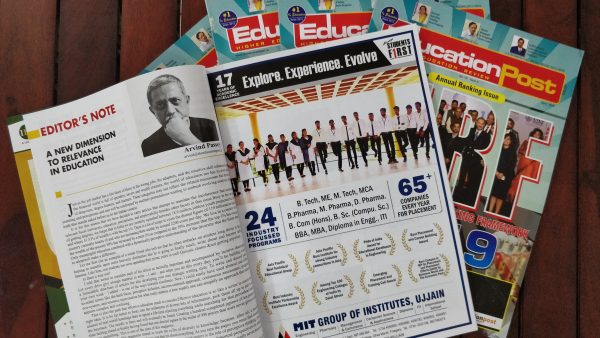Just as the job market has a fair share of those in the wrong jobs, the adapters, and the intuitive skill enhancers and the financial world is full of spenders, savers and wealth creators, the world of education too has its own share of drop-outs, degree hunters, and learners. These categories may not reflect the related microcosm but throw in yearning and perceptions and one will be confronted by multiple permutations waiting to ambush evolving analysis of the truth that stands naked before us in the Indian context.
It is for this reason that we have decided to carry articles that attempt to translate the incoherence that surrounds relevant fiscal intricacies, education, perceptions, and employability besides other facets in this issue. Busy in the rat-race of getting degrees, we forget that in India we are currently squashed between 18.9 million jobless youth projected for 2019 and where 51.53% of wealth is with the top 1%. There is a lot of scope to cross the dismal figure of 119 billionaires that the country currently boasts of and who are increasing their wealth by around 2200 crore per day. We live in a country where the wealth of the poorest 50% has increased by a mere 3% as compared to the 39% increase that the top 1% has managed. Only meaningful education combined with a dynamically perceptive understanding of the diversity that the future intends to adopt will make a difference.
Let me first cite an example of a writer friend who told me that he often embarks on aimless long drives in his car hoping to stumble upon some heavenly destination that he is going to finally reach, write about and become rich and famous. Like him, our students too were spending their prime years in such Quixotic chases & not getting anywhere.
Is there a way out?
I told that writer to consider each of his drives as tactically important and accompanied by incisive observations. Let every drive give enough material to write – I said – and when you do this every day, you’ll be building not only a formidable data-base of articles but also developing your own strategic writing style. To write and discard parts of your own work – I added – is one of the ways towards excellence. Now, I could easily have used abstract and difficult-to-relate terms like die-hard focus, perceptive inclusion, success-centered approach, continuous assessment, progressive eco-system, and resource rejuvenation but what really matters is how readily one can simplify an approach that otherwise appears complex and confusing.
This is also the path that effective education needs to consider. Effective education is so like a writer in search for the right idea. It is by far better to foray into the wilderness of diverse bits of information, pick them all up to add to one’s arsenal of real world learnings than to spend a life-time rejecting everything while searching for that proverbial needle in the haystack. The needle is there and will eventually be found. Creating a hundred completed jigsaws of ten pieces each than feeling elated at finally having found that one desired jigsaw in the midst of 990 pieces that were never given a chance to mean something. This is one of the aims of this magazine.
The articles in this magazine intend to touch the core of diversity in knowledge because, after all, a successful youngster just out of college needs to know just that bit about everything. As you turn the pages you must find meaning in every bit starting from opportunities and challenges for the unorganized sectors to the role of perceptive thinking, from the tenets of entrepreneurship to the relevance of react.js blockchain in the banking sector, from historical perspectives on education to the way women’s day needs to be seen and more. There is no end to knowing more because one really never knows when and how information and analysis comes rushing to help one reach one’s dreams.
I sincerely hope that the readers of this magazine will write back to us not just with their opinions about the articles but also the topics that they want to be included in future editions. We hope to be increasing the ambit of topics covered in these pages and I’m sure there will soon be articles that give insights into diverse topics like podcasts for the decision-maker, relevance of story-telling for the marketer, the rising power of micro-blogging in sales, role of advertising that is cost effective, the online tsunamis that offline organisations face, and so on.
This is the text of my editorial in the April 2019 issue of ‘Education Post’.
.
.
.

.
.
.
Arvind Passey
12 April 2019








